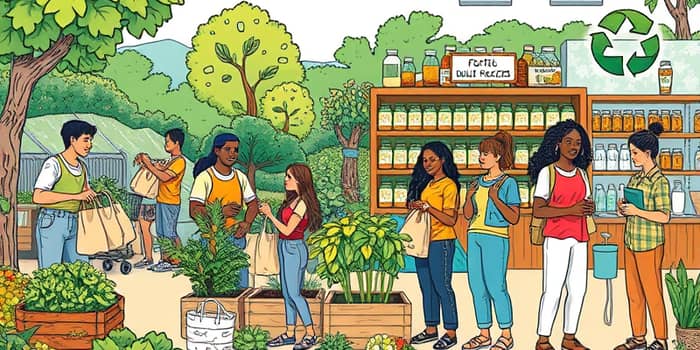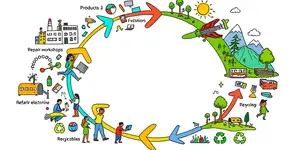The zero-waste lifestyle challenges us to rethink how we consume, discard, and value resources. As our global waste footprint grows, this philosophy offers both practical habits to minimize waste and a bigger vision: transitioning from a linear “take-make-dispose” economy to a circular system where nothing is wasted.
Understanding Zero-Waste Philosophy
At its heart, zero waste is a commitment to minimizing the amount of waste an individual generates, while actively seeking ways to keep resources in continuous use. Rather than viewing garbage as an inevitable byproduct, proponents see waste as a resource to recover and reintegrate into supply chains.
This concept draws deeply from Indigenous wisdom and early environmental thinkers. Before mass-produced plastics and fast consumption became prevalent, communities routinely repaired, repurposed, and rationed goods. Modern zero-waste advocates aim to rekindle that spirit, adapting traditional strategies to contemporary challenges through innovation and conscious choices.
The 5 Rs: Core Principles
The zero-waste movement is often guided by the “5 Rs”—a hierarchy for reshaping everyday behavior:
- Refuse single-use and unnecessary items.
- Reduce overall consumption patterns.
- Reuse durable, long-lasting alternatives.
- Recycle materials that cannot be refused, reduced, or reused.
- Rot (compost) organic waste to enrich soil.
Below is a concise comparison of each R and what it entails in practice:
Practical Habits to Adopt Today
Adopting zero-waste habits can feel overwhelming at first, but small steps lead to big, lasting environmental impact. Start with simple swaps and build confidence:
- Carry a set of reusable utensils, straws, and a cloth napkin.
- Refill water bottles, coffee cups, and toiletry containers.
- Shop bulk bins with your own jars or cloth bags.
- Set up a basic compost bin for kitchen scraps.
- Repair clothing and electronics before discarding.
Over time, these habits become second nature, cutting both waste and spending while fostering creative problem-solving.
Environmental and Societal Impacts
Zero-waste living extends beyond individual benefits. By reducing reliance on disposable goods, we can:
- Cut greenhouse gas emissions tied to production, transportation, and disposal.
- Ease pressure on landfills and incinerators worldwide.
- Decrease plastic pollution that chokes oceans and wildlife.
- Encourage businesses and policymakers to design for reuse and repair.
When communities embrace zero-waste principles, we witness transformative shifts in consumption patterns and supply chains, ultimately steering society toward a more resilient and equitable future.
Overcoming Challenges and Realism
While the ideal of sending zero waste to landfill is inspiring, it remains an ongoing pursuit rather than an absolute endpoint. Complex global supply networks often make it hard to avoid packaging or source plastic-free alternatives for certain goods, such as medications and electronics.
Zero waste is best framed as an aspirational framework emphasizing continual improvement, not perfection. Common obstacles include:
- Limited availability of package-free stores in many regions.
- Time and knowledge required for composting or DIY repairs.
- Inadequate recycling and composting infrastructure locally.
- Higher upfront costs for sustainable products.
By acknowledging these barriers, advocates work both individually and collectively to expand access, build supportive networks, and push for legislative changes that lower hurdles for everyone.
Inspiring Stories and Next Steps
Across the globe, zero-waste champions have sparked powerful change. Béa Johnson’s kitchen, famed for producing a single jar of trash per year, illustrates how far dedication can go. Community gardens turned compost hubs and refill markets popping up in urban centers demonstrate the momentum building at grassroots levels.
To join this movement:
- Conduct a waste audit at home to identify biggest trash sources.
- Create or join a local swap group for clothing, tools, and toys.
- Advocate for package-free options at grocery stores and farmers markets.
Each step, no matter how small, moves us closer to a world where resources are treasured and reused, fulfilling the journey toward lasting sustainability one decision at a time.
Embracing zero waste transforms daily routines into acts of environmental stewardship. By refusing unnecessary items, choosing durable alternatives, and circling materials back into use, we not only reduce our landfill burden but also inspire systemic shifts. Remember, every item you redirect from the trash is a victory in the ongoing quest for a cleaner, healthier planet.
References
- https://earth5r.org/a-beginners-guide-to-zero-waste-living-2/
- https://www.weforum.org/stories/2023/02/zero-waste-guide-reuse-items/
- https://www.northriverside-il.org/647/Zero-Waste-101-A-beginners-guide
- https://www.ecocollective.com/blogs/blog/a-guide-to-zero-waste-living-and-where-to-start
- https://utopia.org/guide/zero-waste-lifestyle/
- https://ied.eu/blog/sustainability-blog/what-is-a-zero-waste-lifestyle-and-how-to-achieve-it-with-tips/
- https://lochtree.com/blogs/blog/what-is-a-zero-waste-lifestyle
- https://entechonline.com/zero-waste-lifestyle-the-beginning/










